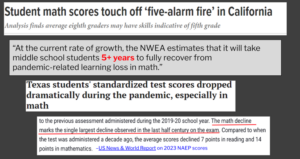04.29.24Research Into Practice: The Crisis in Math Scores and Our Journey to Understand What Drives Learning

A Math Crisis: In the offing long before it made headlines…
A lot of what we do on our team boils down to wiring ourselves for learning: confronted with a teaching and learning problem, we try to assemble the right people and design the right processes to find solutions. One way we do this is though multiyear partnerships. This allows us to learn alongside school partners for a sustained period of time in which we jointly pursue solutions that improve outcomes for students.
One of the most fruitful and promising of these partnerships is our Memphis School Leader Collaborative (MSLC). Designed and led by three members of our team—Joaquin Hernandez, Jack Vuylsteke and Teneicesia White, alongside two amazing school-based leaders—Rebecca Olivarez of Memphis Rise Academy and Denarius Frazier of Uncommon Schools– the collaborative allows us to work with 13 high-quality schools and networks in Memphis.
In the first two posts of this series, Joaquin shares some highlights on how this partnership has helped us begin addressing challenges in math achievement which have subsequently become national headlines.
Background
In the wake of the global pandemic, schools across the country saw steep declines on a wide range of state and national assessments in reading and math, with the effects on math performance particularly pronounced.
In a June of 2023, article titled, “U.S. Teens’ Reading and Math Scores Feature Largest Declines Ever,” U.S News and World Reports noted, in math scores, “the single largest decline observed in the last half century.” Headlines like the ones above were everywhere. Even more troubling is that the impact on math proficiency exacerbated inequities, leaving socioeconomically disadvantaged students even further behind their more affluent peers.
The situation is urgent but its roots go back further. As the controversy surrounding California’s ill-advised and poorly researched math framework reminds us, math instruction was often poorly designed even prior to the disruptions of the past few years. And even when math programs are well designed, materials are often difficult for teachers to use.
Members of the TLAC team have been working alongside school partners for the better part of three years now to better understand what effective math instruction should look like and what the barriers are that prevent optimal implementation. We’ve studied the design, planning and delivery of math lessons in dozens of schools to connect evidence-based practices to real world challenges and have used cycles in which we filmed teachers and studied the resulting student work study to better understand how research, curriculum and pedagogy can come together to cause far greater rates of student success and achievement.
Better Together: The Memphis School Leader Collaborative
Like the rest of the country, schools in Memphis saw post-pandemic declines in math performance. To address this, coaches and math educators from the Memphis community collaborated with TLAC to form the Memphis School Leader Collaborative (MSLC). Together, we engaged in a deep study of evidence-based best practices for planning and delivering high-quality math instruction. We also coupled this training for teachers with robust support and professional development for instructional coaches. Through the generous support of the Hyde Family Foundation, Memphis Education Fund, and an anonymous donor, we grew the collaborative to 13 schools and networks this year, to collectively impact 3,800 students across Memphis.
Impact Data: On The Right Track
While the year isn’t over, mid-year data suggests we are on the right track. As of February 2024
- 10% more students in MSLC schools were projected to be on track to meet/exceed state grade level proficiency, equating to 117% growth in MSLC schools’ results over last year. That improvement is an estimated 360-380 additional students projected to reach state grade level proficiency targets in math.
- We are also solidly in range of achieving our ambitious Success Rate Goal of helping 75% of math classrooms achieve Annual Measurable Objectives (AMO), which are state proficiency goals set by Tennessee’s Department of Education.
- Retention data also indicates that 83% of MSLC teachers and 100% of coaches report that they plan to return to their schools next year, and a majority of those educators explicitly cited the impact of the PD and support they received around math instruction.
Schools are complex environments with many variables at play, so it’s hard to attribute results to just one intervention. That being said, we’re proud of the hard work of MSLC teachers and coaches and the academic growth they’re seeing across their math departments.
Upcoming Posts:
Over the next series of posts, we will share what our team is learning from our experience training and supporting teachers and leaders in implementing research-informed best practices. Specifically, we will:
- Spotlight the work of Madi Bienvenu, an 8th grade Algebra I teacher at Memphis Rise Academy, who has participated in MSLC for the past two years, and who has helped her students achieve standout results on state exams.
- Explore the benefits we see from helping educators establish and implement a shared mental model for how a math lesson can unfold and the planning and preparation (with curricular materials) that drives it.
- Share the benefits we are seeing from bringing schools together for content-specific collaboration and the practices we are using to facilitate learning across different schools and networks.
